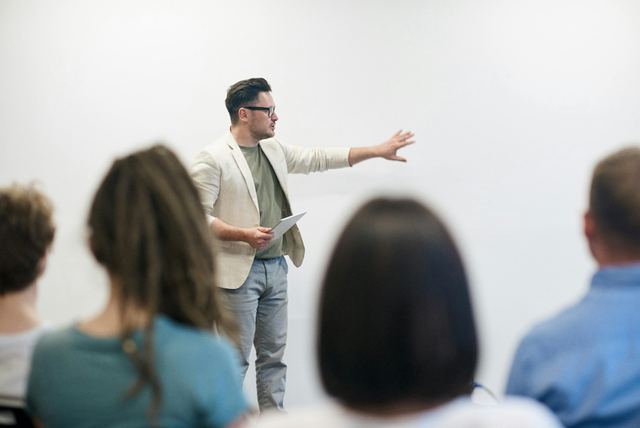Tentang KamiPedoman Media SiberKetentuan & Kebijakan PrivasiPanduan KomunitasPeringkat PenulisCara Menulis di kumparanInformasi Kerja SamaBantuanIklanKarir
2025 © PT Dynamo Media Network
Version 1.101.0
Konten dari Pengguna
Percentage of S1 Qualified Teachers at the Education level
18 Oktober 2024 11:03 WIB
·
waktu baca 4 menitTulisan dari Iyadh Adam tidak mewakili pandangan dari redaksi kumparan

ADVERTISEMENT
Teachers are professional educators who have the main responsibility of educating, teaching, guiding, training, assessing, and evaluating students in early childhood education through formal, primary, and secondary education. Meanwhile, educators in higher education are called lecturers and are professional educators and scientists whose main mission is to transform, develop, and disseminate science, technology, and art through teaching, research, and community service.
ADVERTISEMENT
Teacher or Professor is still the highest position of teaching lecturer at a university. Teachers and lecturers deserve to be called experts because their work and activities that are a source of livelihood for a lifetime certainly meet certain standards and quality standards, skills that require special training, That's when abilities and skills are needed. And teachers and instructors who are certified educators formally state that the teacher or instructor is recognized as an expert.
Article 39, paragraph (2), of Law No. 20/2003 on the National Education System states that educators are professionals. The professional position of teachers and lecturers has a vision to realize the implementation of learning according to the principles of professionalism in order to ensure the equal rights of all citizens to quality education. And by 2015, all teachers must have a bachelor's degree and be certified educators. Provisions for teachers to obtain a bachelor's degree (Diploma IV) are contained in Article 9 of Law No. 14/2005 on Teachers and Lecturers, which states: The validity period of teachers' current qualifications and certification degrees is also regulated in the same law, namely Chapter 5 (Final Regulations), Article 82, Paragraph 2, which states: “This law requires evidence of educational background and teaching certification to be submitted within 10 years from the date of enactment of this law. “Meanwhile, this law was enacted in 2005 and was passed and promulgated on December 30, 2005. And because 10 years have passed since Law Number 10, the deadline is 2015. Article 14 of 2005 on Teachers and Lecturers was promulgated. The discussion on the percentage of kindergarten, primary, junior high and senior high school teachers who have a minimum qualification of S1 is very relevant in improving the quality of education in Indonesia. This standard is enforced to ensure better teaching quality. For example:
ADVERTISEMENT
1. Kindergarten teachers
Kindergarten teachers play a key role in early childhood education, yet many teachers at this level do not have a bachelor's degree. This is due to the relatively recent attention to early childhood education. The government is now encouraging more kindergarten teachers to achieve S1 qualifications through scholarships and competency improvement programs.
2. Primary school teachers
Most primary school teachers, around 75–85%, already have a bachelor's degree, thanks to the teacher certification program that raises qualification standards. This is important as primary teachers are expected to have a deep understanding of basic teaching methods.
3. Junior high school teachers
At the junior secondary level, more than 90-94% of teachers already have a minimum qualification of S1, mainly because they are required to have expertise in specific subjects such as Math, Science or Language. Junior high school teachers tend to focus more on discipline-specific teaching.
ADVERTISEMENT
4. Senior High School Teachers
Almost 95% of senior high school and vocational school teachers have a bachelor's degree, mainly because they teach subjects that are more specific and require more in-depth mastery. Teachers at this level often have degrees in both education and non-education, depending on the field they teach.
This is evidenced by the data on the BPS (Central Bureau of Statistics) website in 2018 which was updated on December 1 that the percentage of teachers in kindergarten, elementary school, junior high school, high school, and special schools with educator certification, the percentage of teachers with a minimum qualification of S1 at the Education Level Unit (Percent), namely kindergarten 72.81% and elementary school 87.79% and junior high school 94.29% and high school + vocational school 96.59% and special school 90.04% of course this data source is from a strong source, namely from the Ministry of Education and Culture in FY 2012 to 2018.
ADVERTISEMENT
Challenges and Efforts to Improve
Although teacher qualifications have improved, especially at the junior and senior high school levels, challenges remain, especially in remote areas. Programs such as teacher certification, Teacher Professional Education (PPG), and scholarships have been attempted by the government to help teachers improve their qualifications.
Conclusion
Overall, the percentage of teachers in Indonesia with a bachelor's degree continues to increase, especially at the junior and senior high school levels. However, equitable distribution of teacher quality across regions, especially in remote areas, is still an important priority to support the overall quality of education.

